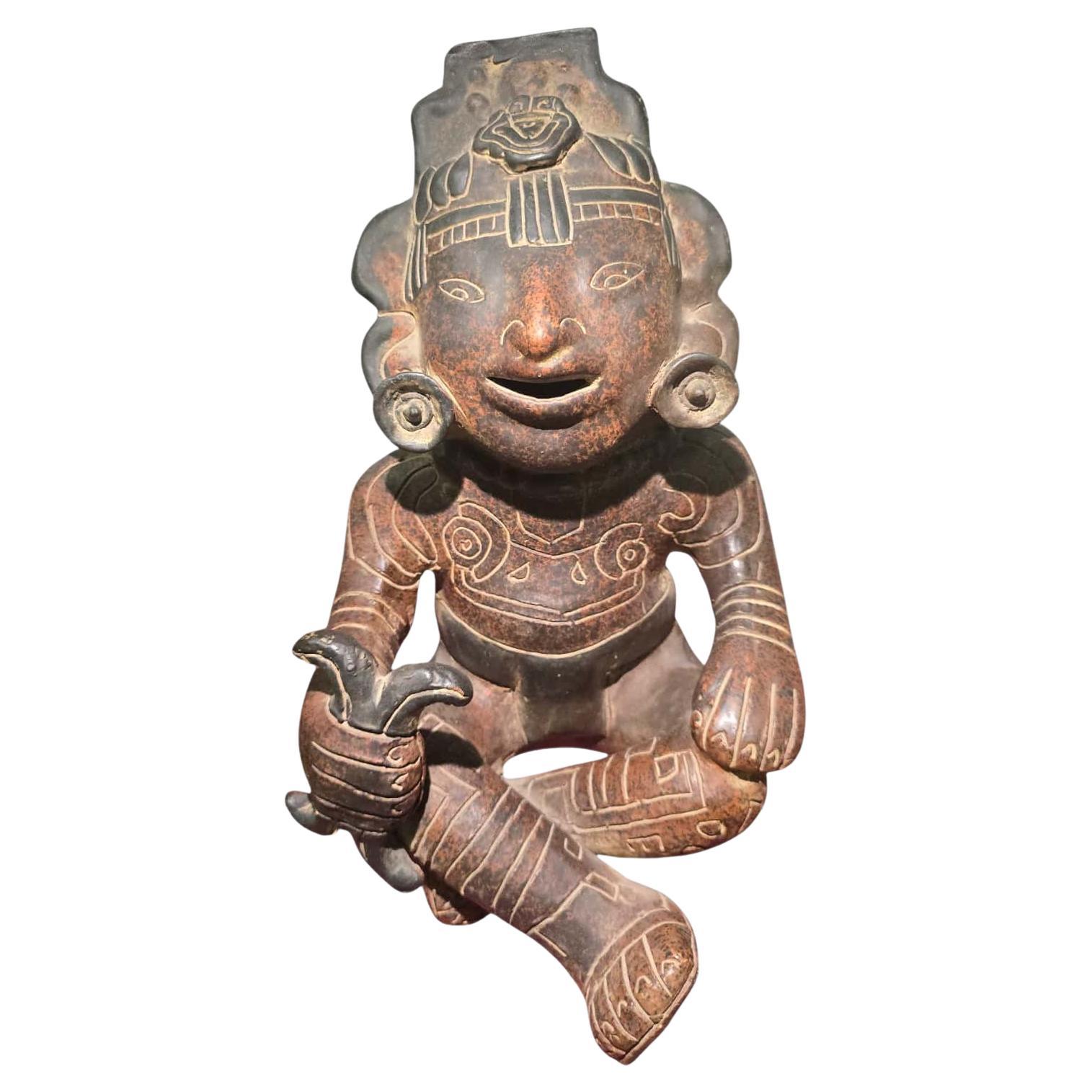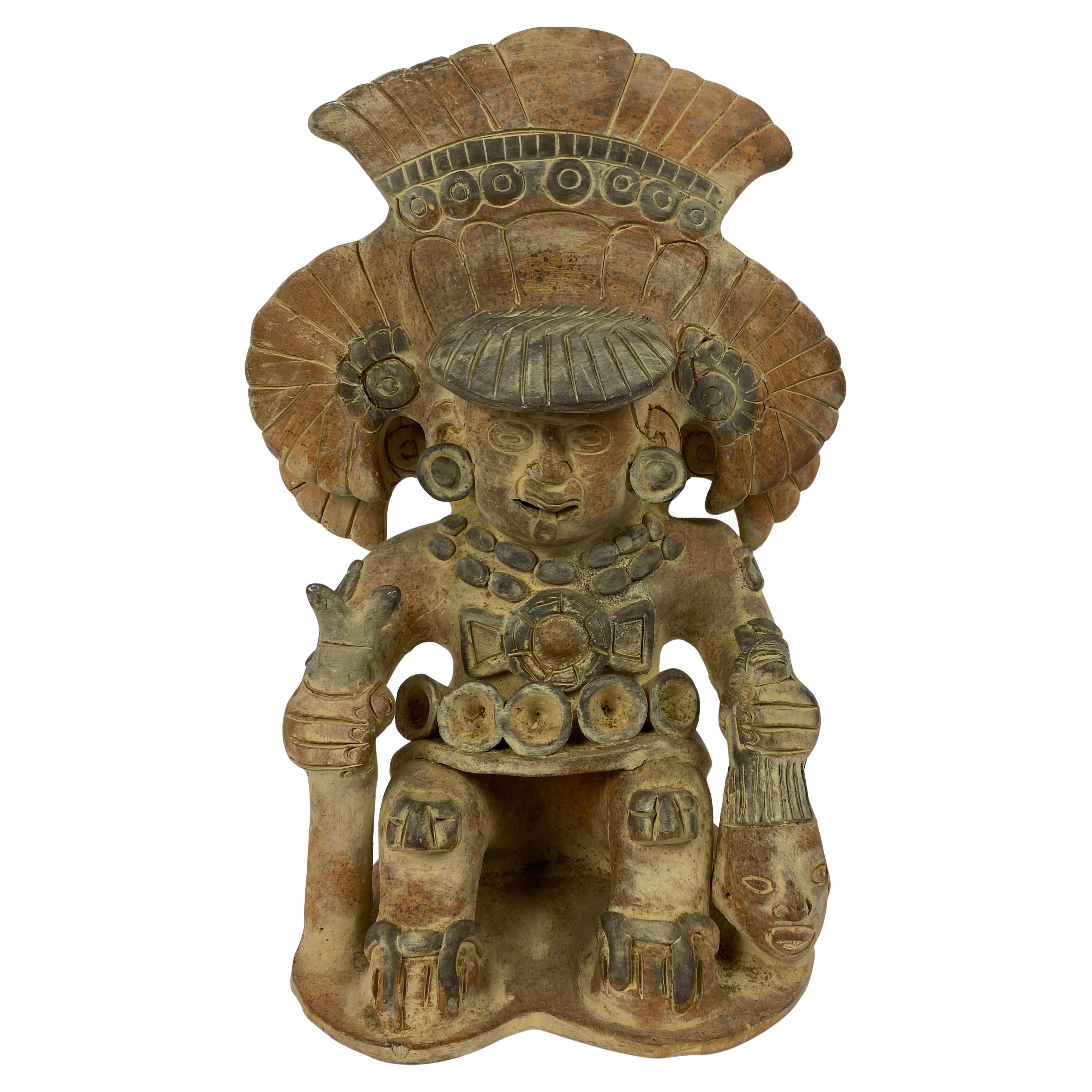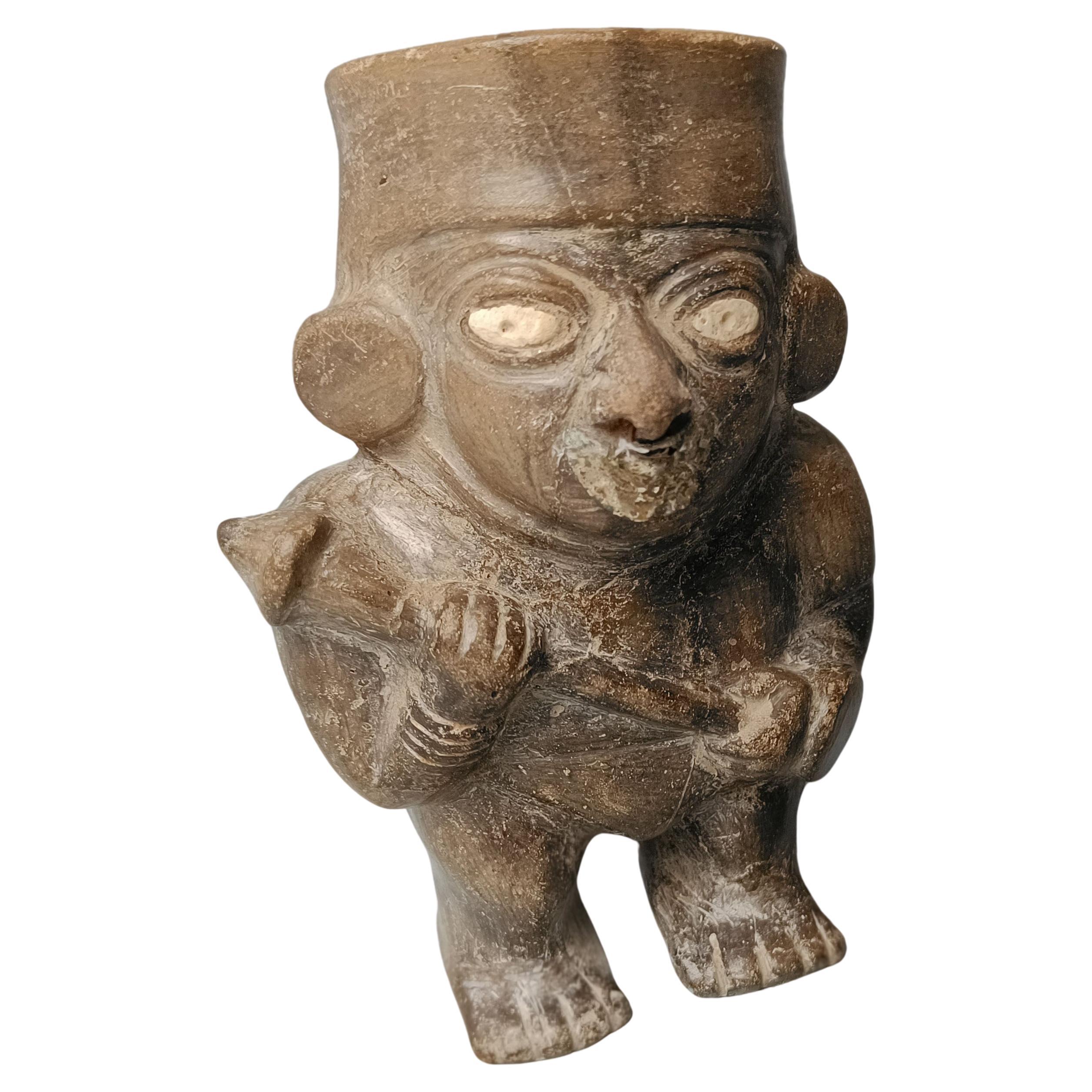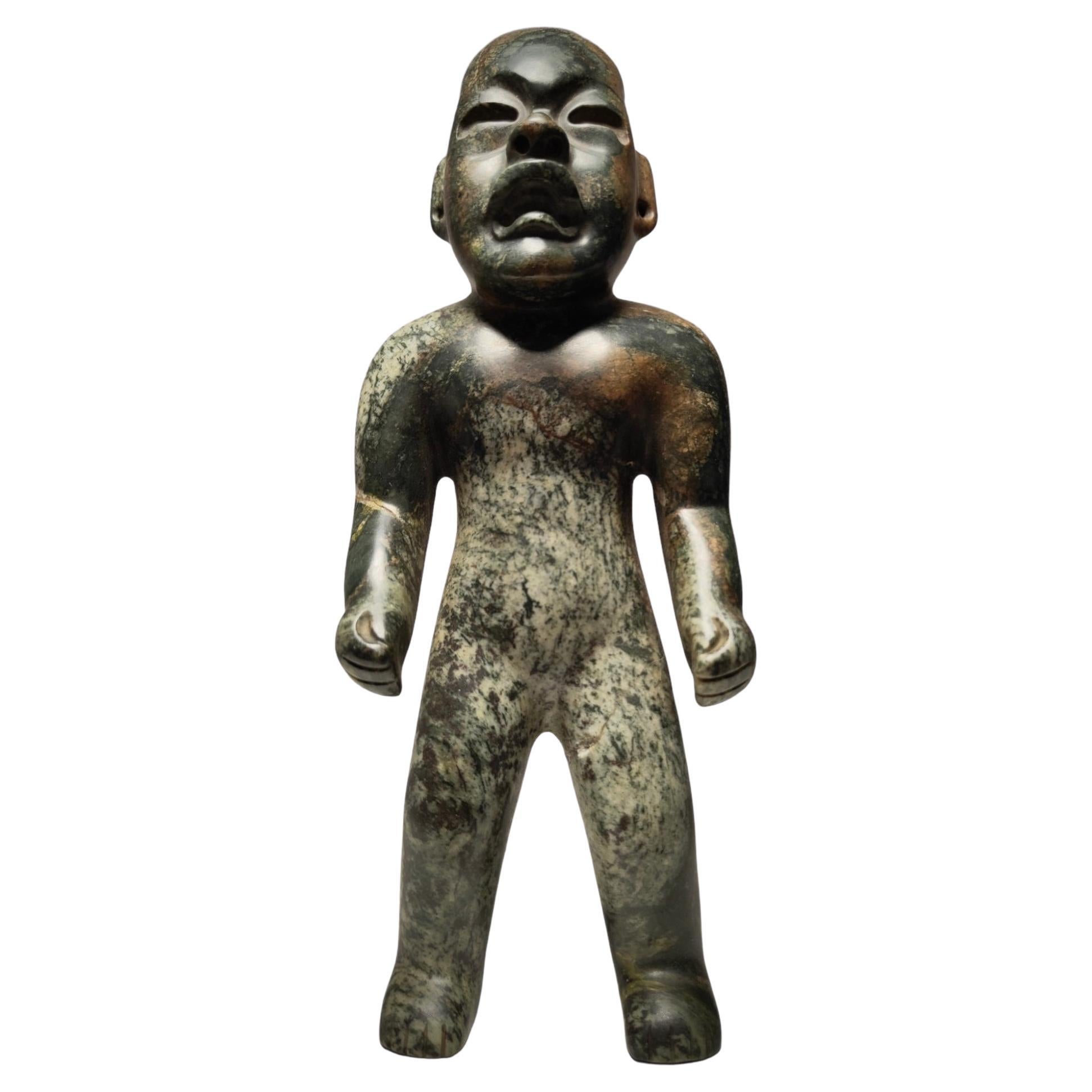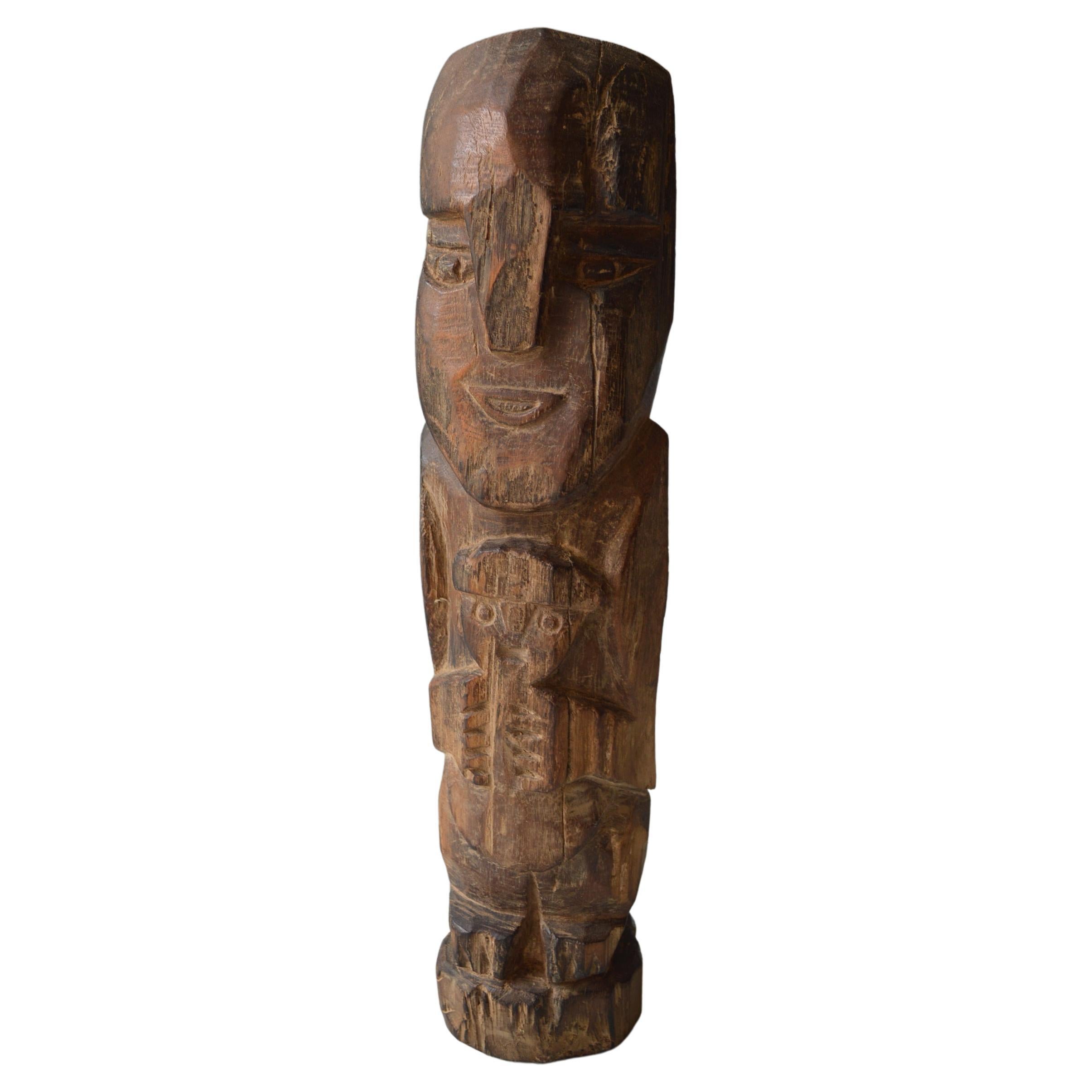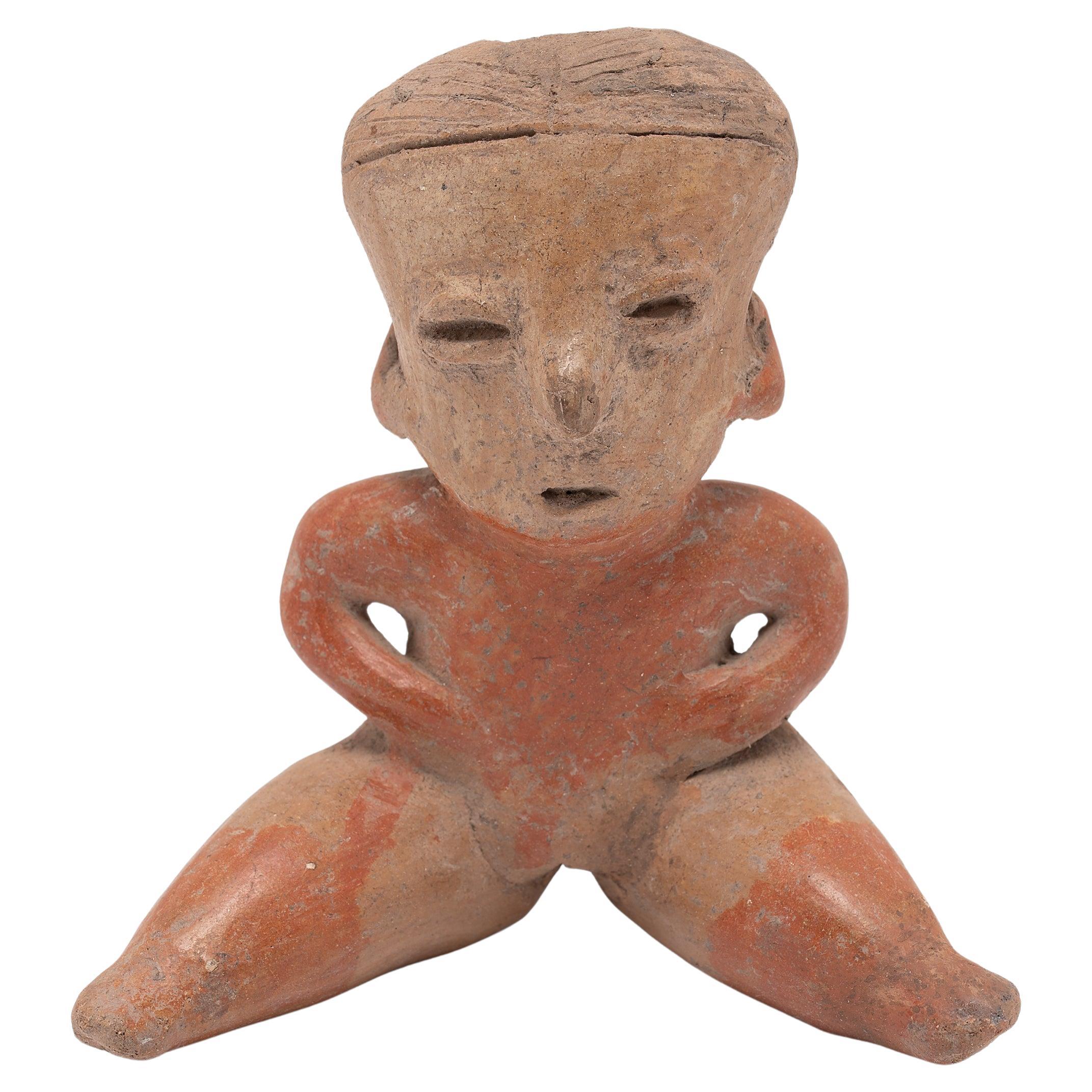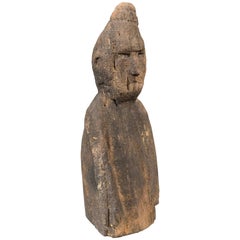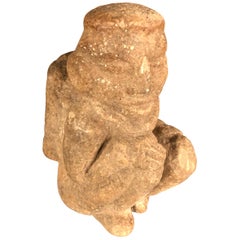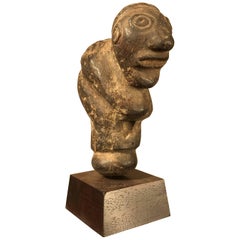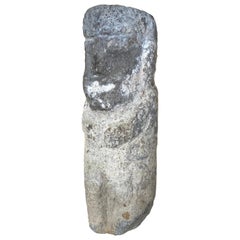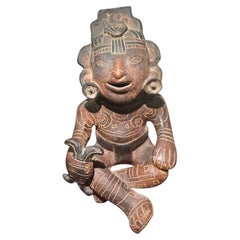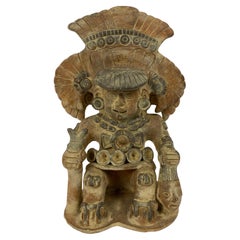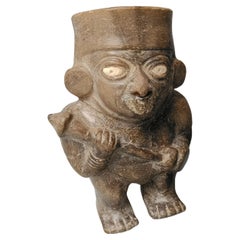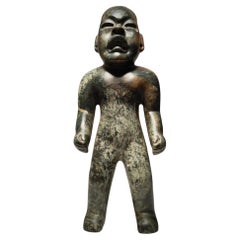Items Similar to Fine America’s Chieftain Ceremonial Figure
Want more images or videos?
Request additional images or videos from the seller
1 of 19
Fine America’s Chieftain Ceremonial Figure
$1,250
£965.84
€1,116.60
CA$1,766.34
A$1,981.07
CHF 1,037.45
MX$24,071.91
NOK 13,173.94
SEK 12,489.82
DKK 8,334.87
About the Item
Pre-Columbian style , Hispaniola, Arawak Peoples, Taino Native Indians
This is a finely carved Taino Cacique Chief's hand carved hard wood figure- a superb ancestor style ceremonial sculpture from the Arawak Peoples of the Greater Antilles Islands. It comes from a Florida collection. We will include a custom display base as shown.
This figure was made from a single piece of wood, representing an anthropomorphic figure with sculptured head and finely engraved with a large Cacique face and linear motifs on the head, chest, and hands. In ancient times similar would have been revered by the a principal practitioner of the cohoba ritual by the Taino's. circa 1200-1550 A.D.
While the precise ancient function of such objects remains somewhat a mystery- they continue to impress us with their bold abstract form and magical associations.
In the seminal book Taino, Pre-Columbian Art & Culture from the Caribbean published by the El Museo del Barrio, ancient figures and duho are discussed at length as private power-objects used in egalitarian tribes and used in public ritual to legitimize the hierarchical social structure of complex chiefdoms. Please also refer to the excellent publication March 1994 seminal article Tribal Arts: The Sculptural Ancestry of the Taino- masterpieces from the Pre-Columbian West Indies.
This remarkable sculpture includes a Zemi figure face which was meticulously incised with round deep-socketed eyes, prominent nasal cavities, drilled ear lobes possibly for feather fetishes, wide open mouth, and lobed ears. Some scholars find such scarifications relate to ancestral and/or fertility myths.
An ancient carved version of this quality and size would have belonged to a chieftain -caciques- or ranking member of the royal household. Although Taino left no written documents, Spanish settlers did record native practices and one account refers to special structures in which chieftains stored their Trove of important ceremonial carvings. The Taino believed in existence of afterlife and Shamanic ability to communicate with the dead. This remarkably evocative work reminds us to peak into ancient splendors of Taino civilization.
Dimensions: 8.25 inches high and 2.25 inches wide
Hand carved.
Provenance: Old Florida collection.
Taino history:
The Taino flourished from 1200-1500.
When Columbus arrived in America, the first people he encountered were the Taino People- inhabitants of the islands of the northern Caribbean Sea, known as Hispaniola. They were Arawakan-speaking people who at the time of Christopher Columbus’s exploration inhabited Cuba, Jamaica, Hispaniola (Haiti and the Dominican Republic), Puerto Rico, and the Virgin Islands. Once the most numerous indigenous people of the Caribbean, the Taino may have numbered several million at the time of the Spanish conquest in the late 15th century.
Their highly developed belief system focused on zemi ancestor or god worship. A zemi was the physical manifestation of a god, spirit or ancestor. The chieftain -caciques- encouraged ancestor worship and were often deified after death. The religious leaders or shamans were thought to be able to communicate with the souls of the dead when intoxicated by the hallucinogenic cohoba. A preoccupation with death is evident in many Taino art-forms and partly explains the prevalence of zoomorphic images. Bats, owls and frogs were all popular motifs and were regarded as harbingers of life after death. The Taino believed that the dead could be reborn in animal form and some believe animals were their earliest ancestors in Taino creation myth. hence we find their zoomorphic sculptures as combinations of human and animal forms particularly provocative and great conversational art. The creator god was known as Yúcahu Maórocoti, encouraging growth of staple foods, like cassava. The goddess was Attabeira, who regulated and dominated over water, rivers, and seas.
Their contribution to the Spanish includes Indian corn, tobacco, rubber balls to unique art and artifacts, plus a new vocabulary. Importantly, the Taino lasting effects on Western civilization, though through brief contact, was an important and lasting one.
Lifetime guarantee of authenticity: All of our works of art come with our Lifetime Authenticity Guarantee.
.
- Dimensions:Height: 8.25 in (20.96 cm)Width: 2.25 in (5.72 cm)Depth: 2 in (5.08 cm)
- Style:Pre-Columbian (In the Style Of)
- Materials and Techniques:
- Place of Origin:
- Period:
- Date of Manufacture:20th Century
- Condition:Wear consistent with age and use.
- Seller Location:South Burlington, VT
- Reference Number:1stDibs: LU1289245167122
About the Seller
5.0
Platinum Seller
Premium sellers with a 4.7+ rating and 24-hour response times
Established in 1990
1stDibs seller since 2015
2,386 sales on 1stDibs
Typical response time: <1 hour
- ShippingRetrieving quote...Shipping from: South Burlington, VT
- Return Policy
Authenticity Guarantee
In the unlikely event there’s an issue with an item’s authenticity, contact us within 1 year for a full refund. DetailsMoney-Back Guarantee
If your item is not as described, is damaged in transit, or does not arrive, contact us within 7 days for a full refund. Details24-Hour Cancellation
You have a 24-hour grace period in which to reconsider your purchase, with no questions asked.Vetted Professional Sellers
Our world-class sellers must adhere to strict standards for service and quality, maintaining the integrity of our listings.Price-Match Guarantee
If you find that a seller listed the same item for a lower price elsewhere, we’ll match it.Trusted Global Delivery
Our best-in-class carrier network provides specialized shipping options worldwide, including custom delivery.More From This Seller
View AllAmerican "Human Effigy" Female Stone Sculpture, Tennessee, 1000 AD
Located in South Burlington, VT
A Native American Human Effigy female statue, Holliston Mills Site, Tennessee , sandstone, circa 1000 AD
Dimensions: 11.75 inches tall and 3.75 inches width 5.75 diameter
All stone carvings from America's Prehistoric past are scarce. The majority of known carved stones come from the far western Mimbres, Hohokam or Casas cultures.
This sculpture is unique.
Quality: fine original condition with varigated patina as found. Notice the detail of the carved ear spools...
Category
Antique 15th Century and Earlier American Native American Objects
Materials
Sandstone
Native America Ancient Hand Carved Stone Pipe Idol Sculpture
Located in South Burlington, VT
From Native America and a collection dating to 1951, comes this unique old hand carved stone human effigy pipe figure idol , likely Hopewell culture with its bun head and ear spool...
Category
Antique 15th Century and Earlier American Native American Objects
Materials
Stone
$3,600 Sale Price
47% Off
Ancient American "Human Effigy" Stone Pipe, Woodland Period
Located in South Burlington, VT
Early American Pre-Historic Human Effigy stone pipe, woodland period, 2500 BP
Formerly in the Harold French collection, Amboy, Indiana (photo)
All st...
Category
Antique 15th Century and Earlier American Native American Objects
Materials
Stone
Native America Ancient Hand Carved Stone Kachina Effigy Sculpture
Located in South Burlington, VT
From Native America Southwest comes this unique ancient hand carved stone "Kachina" sculpture, Chaco culture, Farmington, New Mexico region. ...
Category
Antique 15th Century and Earlier American Native American Objects
Materials
Stone
$3,840 Sale Price
20% Off
Chinese Ancient Stone Male Figure, 206 BC-220 AD
Located in South Burlington, VT
China, a rare hand carved stone male figure from the Han dynasty (206 BCE-220 CE).
Dimensions: 16 inches tall on its custom stand and and 6 inches wide
Condition: old patina wi...
Category
Antique 15th Century and Earlier Chinese Han Sculptures and Carvings
Materials
Stone
$2,800 Sale Price
27% Off
Solomon Islands Santa Cruz Hand Carved Conical Head "Duka" Figure, 1930s
Located in South Burlington, VT
Originally collected in the Solomon Islands in 1938, this one of a kind treasure from the south pacific comes from a private oceanic collection.
This is a Solomon Islands Santa Cruz hand carved figure called a Duka, circa 1930s.
It was carved in an extremely hard native wood and features a finely carved, unusual extended conical head, a handwoven loin cloth and turmeric encrustation. For your convenience, many of our photographs were taken in natural day light which accurately illuminate surface areas depicting original dark patina that you would expect from an important early carving such as this one. We will include a complimentary custom wood display base that you see photographed.
Dimensions: 21.25 inches high
Provenance: collected in l938 and originally acquired by a visiting French collecting tourist in the Solomon Islands then to dealer and Texas collector and to our private collection in year 2000 so could have been a specially crafted fine 1930s tourist sculpture piece for the visiting French tourist.
History:
Duka sculpture from Nendo Island, politically part of the Solomon Islands, is distinctive, and only a limited number of works have been documented. The conical extension at the back of the head represents a man's hairstyle. Called abe, its construction and shape was a symbol of wealth and high social status, and for older men, it also served the practical purpose of covering bald spots. All Nendo figure refer to deities or supernatural beings (Ellis: 2009, pp. 78-85)
Auction sale: Bonhams Auctions April 28, 2015 sale. Exceptional Lime Container...
Category
Early 20th Century Solomon Islands Tribal Tribal Art
Materials
Tapestry, Wood
$7,600 Sale Price
49% Off
You May Also Like
Large Decorative Pre-Columbian Style Figure – 20th Century
Located in Madrid, ES
Impressive Pre-Columbian style figure from the 20th century, crafted in homage to ancient Mesoamerican art. The piece showcases stylized facial features and traditional ornamentation...
Category
Vintage 1950s Figurative Sculptures
Materials
Terracotta
Pre-Columbian Style Mexican Terracotta Statue, Molded Clay Figurative Sculpture
Located in Miami, FL
Vintage, decorative and well-proportioned Mexican primitive figure depicting a man seated, with detailed, patterned clothing. The sculpture measures
16 1/4" High x 12" wide x 9 1/2"...
Category
20th Century Mexican Pre-Columbian Figurative Sculptures
Materials
Clay
$1,520 Sale Price
20% Off
Pre Columbian Rare Moche Warrior Vessel South Latin American Antiques Art
Located in London, GB
Pre-Columbian Moche Warrior Vessel – Moche V Period, 600–700 AD, Peru
A striking and rare example of Moche ceramic artistry, this Pre-Columbian greyware warrior vessel dates from th...
Category
Antique 15th Century and Earlier Peruvian Antiquities
Materials
Pottery
Important Olmec figure of Olmec ethnic dignitary from the preclassic period
Located in Madrid, ES
Important Olmec figure of Olmec ethnic dignitary from the preclassic period (2500-200 BC)
Important Olmec figure of dignitary of the Olmec ethnic group of...
Category
Antique 15th Century and Earlier Figurative Sculptures
Materials
Precious Stone
$14,395 Sale Price
20% Off
Pre Columbian Rare Lambayeque Wood Figure
Located in London, GB
Pre columbian Lamabayeque wood figure Peru Circa 750 to 1375 AD
A rare standing figure of a deity with triangular tear drop shaped eyes holding a child,
Carved in very dense heavy hard wood
Measures: Height 14 inches, 36 cm weight, 1.5 kg approx
Ex collection of a Oxford Academic, reputed to have came from Pit rivers...
Category
Antique 15th Century and Earlier Peruvian Antiquities
Materials
Wood
Nayarit Chinesco-Style Figure
Located in Chicago, IL
This seated effigy figure was crafted in 300 BC to 300 AD from the ancient Nayarit region of Mexico and was likely used as a ritual or burial offering. The ceramic works of the Chine...
Category
Antique 15th Century and Earlier Mexican Pre-Columbian Figurative Sculpt...
Materials
Ceramic
More Ways To Browse
American Wood Carving
Carved American Indian
American Masterpiece Collection
Native American Carved Wood
Old Growth Wood Furniture
Old Growth Wood
Carved Fertility
Used Furniture Columbus
Spanish Style Chest
Carved Wood Religious Figure
Owl Figure
Spanish Carved Figure
Native Ceremonial
Indian Goddess
Sea Chest
Hand Carved Owl
Carved Spanish Chest
Tobacco Figure
